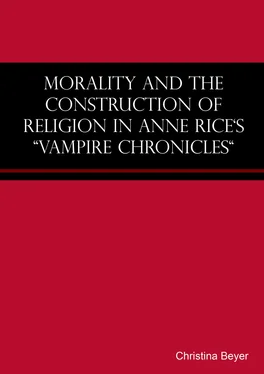This pragmatic way of thinking may come across as cold-blooded or emotionless, but the absence of a guilty conscience allows Lestat to restrict his thoughts to performing an action without thinking about consequences. In fact, due to his strength and superiority, there is not much to fear.
Therefore, Lestat’s behavior can be explained. Still, the rules uphold the safety for the rest of the group. Not being able to respect these rules will be punished with a death penalty. This is what they have in common with Christian ethics. Taking a closer look on the above mentioned five rules of the coven, it becomes clear that abiding them prevents one from any greater danger. That is especially true for the third rule which forbids older vampires to create new fledglings. The justification for that is that they can become too strong and therefore present a threat. Lestat is the perfect example for that, since he is a fledgling of Magnus. By revealing vampire secrets through his book and performing with his band, he puts everyone else at risk of being discovered. Of course, Louis does the exact same thing. However, being a fledgling of Lestat, his very existence goes back to him, too.
Christian ethics, however, function in a very similar way. Behind every rule lies the ever present threat of damnation. This is what makes the vampire existence so depressing for Rice’s characters. Most of them still have Christian concepts in mind and constantly fear damnation, yet at the same time they cannot fight their nature and also have to find a way to live inside their coven. Therefore, the vampire represents a metaphorical being which is often envied by an outside observer for its freedom, but ironically enough, the very opposite is true in the Vampire Chronicles. Keeping this in mind, it becomes more understandable why Louis suffers so much.
A comparison of two moral extremes – Louis and Lestat
It is obvious that Louis and Lestat represent two opposites in The Vampire Chronicles. The striking difference regarding moral questions and their outlook on life in general is what makes the story interesting. Moreover, they represent two different ideals. Both are worth to be considered in more detail. Whereas Louis has a very clear idea on religion and its moral concepts, Lestat is mainly free of such preconceptions. Therefore, both ideals are shown in the following chapters.
Louis – consequences of a religious upbringing
Louis comes from a very religious background. Especially his brother was known for being extremely fanatic when it came to religious matters. Louis says about him “My brother was to be a great religious leader, to return the country to its former fervor (France), to turn the tide against atheism and revolution. (Interview with the vampire 8) When his brother dies, Louis feels he is responsible for his death. Even though that is most definitely not the case, he cannot let go of feeling guilty. Therefore, he seeks the advice of a priest to whom he admits that he knows he did not kill his brother. After Luis has admitted to not being able to carry on life, the priest answers “‘That’s ridiculous,‘ (...) ‘Of course you can live. There’s nothing wrong with you but self-indulgence.“ (Interview with the Vampire 12)
Louis seeks the advice of a priest twice in Interview with the Vampire . The first time he is still human and even though he feels remorse about the tiniest things, in general, he cannot really be considered to be guilty of anything. The second time he encounters a priest, he must have killed approximately 50.000 people, considering that Louis has murdered two people a night on average, for seventy years. This time the priest has less friendly words for the vampire, but more importantly, Louis’ attitude towards Christian ethics has changed, as well. He confronts the priest with his doubts.
“’Why, if God exists, does He suffer me to exist!‘ I said to him. ‘You talk of sacrilege!‘ He dug his nails into my hands, trying to free himself, his missal dropping to the floor, his rosary clattering in the folds of his cassock. He might as well have fought the animated statues of the saints. I drew my lips back and showed him my virulent teeth. ‘Why does he suffer me to live?‘ I said.“ (Interview with the Vampire 146-147)
Given the assumption that God exists and that Christian ethics are something relevant, as well, the suffering of Louis is due to not being able to live according the Christian belief. Therefore, damnation is the only possible consequence for him. It becomes very obvious that Louis has a concept in mind which consists of the ideas of what is either good or evil. At this point, it is worth having a closer look on Christian ethics. In order to understand what good and evil can account for in Christianity, one needs to understand that these attributes are the two extremes of a scale.
David S. Cunningham is concerned with explaining these. He starts by pointing out that ethics are oftentimes two options only, namely right or wrong, or in other words, good or evil (Cunningham 20). This “two-choice system“ as he calls it, is helpful when it comes to clarifying questions that can only be answered with yes or no. As an example, he names the turning off of life-support systems, a question which requires a decision of yes or no. Anything in between would not make sense (Cunningham 22). In other cases, Cunningham is aware that choices that leave no gray area in between are likely to become very hard to judge (Cunningham 23). In fact, these decisions are the ones that occur most often (Cunningham 24). Therefore, it is no surprise that they do occur for Louis, as well. It is not a question that can easily be answered with “yes“ or “no“ when he is torn apart between the physical need for human blood and his refusal to hurt someone. Instead, Louis has to make a decision between his own life and the life of someone else. How is it possible for anyone to decide whose life is more valuable than that of somebody else’s?
There are certain principles by which one can decide if an action is morally right or wrong. One of these is the law of a society, according to which people can be forced to act in certain ways (Cunningham 31). Thus, the aspects of the relationship
between law and morality are explained. As it is impossible to control the thoughts of another person who, for example, has the desire to kill another human being, the law is mainly concerned with forbidding bad behavior (Cunningham 36). It is hard to encourage good behavior, but some people show tendencies of living a life that is likely to overstep to legal boundaries of the law (Cunningham 37). On the other hand, living according to the law does not necessarily mean that a person is good (Cunningham 38).
At this point, Cunningham introduces Paul of Tarsus, a Bible interpreter who believed that the law is complete only with the person of Jesus (Cunningham 40). Cunningham tries to justify this idea by explaining that Christianity is based on living in communities. He believes that individualism cannot exist in a world in which everything is connected.
“Our assumptions are largely inherited from those by whom we are surrounded. Even if we rebel against our communities of origin, we still find ourselves shaped by their structures – just as a jet of water is shaped and oriented by the pipe through which it is being pumped. We are connected to one another in deep and abiding ways, as we are sometimes surprised to discover.“ (Cunningham 47-48)
Here, again the value of a moral community becomes important again. To be able to live among others, certain rules need to be respected. That is not only true for religious communities, but for all kinds of communities. In order to live together peacefully, certain rules need to be established. To be able to evaluate ethics religiously, it is necessary to be familiar with the concept of sin. According to Quinn, “The concept of sin is the concept of a human fault that offends a morally perfect God and brings with it guilt.“ (A companion to philosophy of religion, Quinn 541) The Bible distinguishes between personal sin and original sin . Whereas the original sin is inherited by birth and goes back to Adam and Eve, the personal sin is performed individually and independent from the fall of Adam and Eve. One performs a personal sin if by the act of the person God (if He exists) is offended. Therefore, the sinfulness of a person’s actions depends on God’s existence. Still, an action can be morally wrong in itself.
Читать дальше









